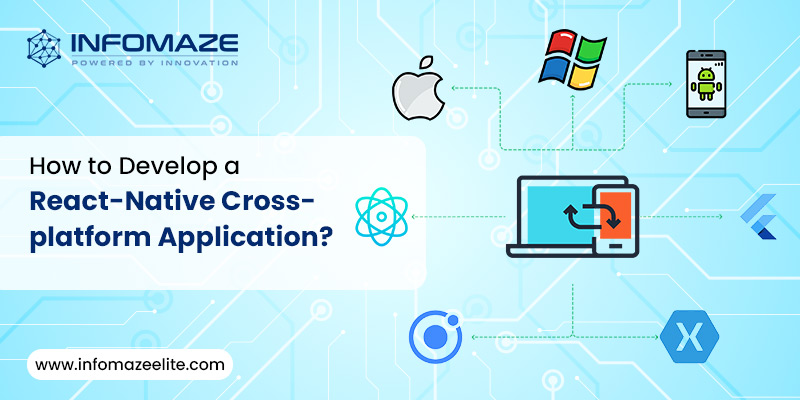Building a Cross-Platform App with React-Native
The technique of using React Native to create mobile apps has been revolutionary, changing the way that app development works. With the help of an open-source framework called React Native, react-native app developers can produce reliable and effective apps for various platforms from a single codebase.
Key Significances of Cross-Platform App Development React-Native
Single Codebase:
It reduces time and costs because you need to develop a code only once and deploy it on multiple platforms.
Hot reloading:
Develop more efficiently with real-time code updates that don’t require app restarts.
Large Community Support:
A vibrant community and a vast collection of third-party libraries enable rapid solutions to problems.
Updates without App Store Approval:
Over-the-air updates to immediately fix bugs and set up new features.
Time Efficiency:
Using libraries and pre-built components speeds up development.
How to Develop a React-Native Cross-platform Application?

There are several steps involved in building a cross-platform React Native application. You can use JavaScript and React to build mobile applications with React Native. Here are the steps to create a React native app:
Set up your Development Environment
Install npm and Node.js to set up your development environment for React Native. Install the React Native CLI globally using npm. Next, use the CLI to launch a brand-new React Native project. By performing this, you build the foundational structure needed for developing cross-platform mobile applications, allowing you to use JavaScript and React to create apps for both iOS and Android.
Project Structure
Folders like android/ and ios/ hold platform-specific code, while src/ contains React Native code in a React Native project structure. These directories help in project organization by separating common code from platform-specific implementations. Comprehending and navigating through this framework is important for the effective development and maintenance of cross-platform mobile applications.
Code Structure
React Native’s code structure follows React’s component-based design, which involves organizing components under the src/ directory. Every component manages a specific component of the application. The scalability, reuse, and maintainability of the code is enhanced by this modular strategy. It adheres to the principles of React, simplifying the management of the app’s UI and functionality and fostering an efficiently structured codebase.
Run the App
Use the command npx react-native run-android for Android or npx react-native run-ios for iOS to launch a React Native application. These instructions launch the application on the respective emulators or linked devices. In this phase, the application is installed, the development server is started, and the JavaScript code is compiled.
Debugging
In React Native, debugging involves identifying and resolving issues with the application’s code. React DevTools and React Native Debugger are two examples of tools that developers can use to inspect items, track changes in their state, and trace data flow.
Debugging makes an application more stable by assisting in the identification and correction of issues. Also, the React portion of the application can be debugged using regular browser debugging tools. For a seamless and error-free user experience across several platforms, debugging is essential.
Styling
Component style in React Native uses a subset of CSS. Just as with web development, styles are defined using stylesheets. Certain characteristics and styles, however, could act differently. Layout often utilizes Flexbox. External stylesheets or inline styles can be used to style components.
Cross-platform uniformity should be achieved by implementing responsive design concepts. Enhancing the mobile application’s visual attractiveness and user experience on a variety of devices is primarily based on styling.
State Management
React Native state management involves handling and maintaining the state data for the application. The built-in state of React or third-party frameworks like Redux or MobX is accessible to developers.
Maintaining a consistent data flow within the application, allowing components to respond to changes, and ensuring an excellent user experience ultimately rely on an effective managing state.
Navigation
To navigate a mobile application, one must switch between multiple screens or views using React Native. React Navigation is a commonly used navigation framework that offers a wide range of navigators for different uses. It allows developers to incorporate smooth and simple navigation, improving cross-platform apps’ user experience.
API Integration
React Native API integration involves connecting the application to other databases or services. Developers use tools such as Axios and the fetch API to perform network requests. Promises or async/await are used for managing asynchronous operations. This improves the app’s functionality by enabling dynamic data fetching and updating.
Testing
Unit testing in React Native requires the use of tools such as Jest. To make sure logic and components work as intended, developers develop tests. Using the npm test to run tests confirms functionality, identifies issues early in development, and maintains the program’s reliability on several platforms.
Launch Your App
Build your React Native app with npx react-native run-android and npx react-native run-ios to launch it on both Android and iOS. Apps should be submitted to the Apple App Store and Google Play Store.
Final Thoughts on React-Native Development Services from Infomaze
We offer top-notch React Native Development Services, showcasing exceptional expertise, performance, and innovation. With a focus on reliability, they deliver high-performance, cross-platform solutions tailored to specific business needs.
Infomaze stands out for our commitment to excellence, ensuring a seamless and effective React Native development experience. Our skilled React-Native app developers use the power of React-Native to create robust applications and meet the unique requirements of your company.
Through innovative approaches and a reputation for reliability, we provide a comprehensive suite of services at an affordable price, making us a trusted partner for businesses seeking efficient and cutting-edge React Native development services.
Categories
- AI/ML (6)
- Application Migration (8)
- BI (7)
- Case Study (28)
- CRM (8)
- Dot Net (8)
- Informational Blog (71)
- IT Help Desk (8)
- Mern Stack (1)
- Microsoft 365 (2)
- Mobile Application (9)
- Offshore Development (10)
- Outsourcing Services (1)
- PHP (11)
- PowerBI (7)
- QuickBooks (6)
- ReactJS (4)
- SEO (14)
- SharePoint (3)
- Web Application (10)
- Xero (1)
- Zoho (15)
- Zoho Case Study (38)




Disclaimer: All rights belong to the owner. No Copyright or Trademark Infringement Intended.





